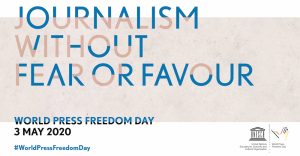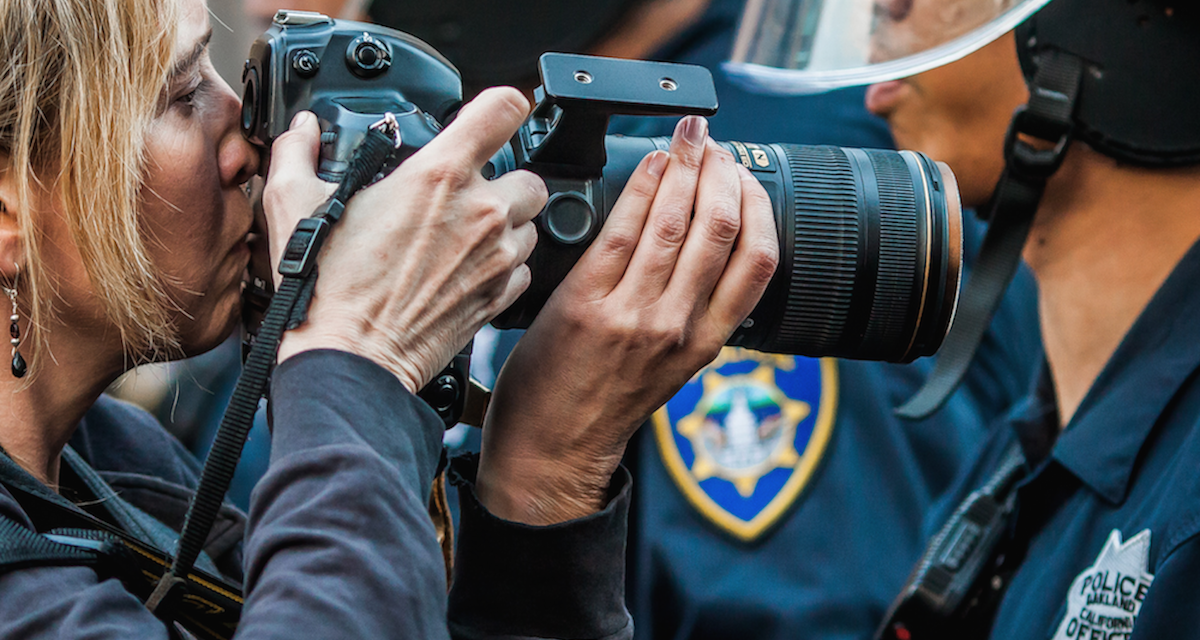Every year, World Press Freedom Day (May 3) is a day when we celebrate the fundamental principles of press freedom and the invaluable work journalists do to provide the public with reliable and accurate information.
Confronted as we are with the current COVID-19 pandemic, the role of journalism that is guided by a commitment to the truth – and an absolute obligation not to deceive – is more important than ever. That commitment must be upheld through the professional discipline and integrity of journalists who can ensure that facts and opinions are not misrepresented. By standing up for free and independent journalism we stand up for our common right to seek and receive the accurate and reliable information on which we all must make decisions that – at this time of a global health crisis – are a matter of life and death.
The coronavirus pandemic has been described as ‘the greatest threat to the global news industry since the 2008 economic crash’.[1] The 2020 Press Freedom Index, compiled by the press freedom organisation Reporters Without Borders, alerts us to the fact that geopolitical, technological, democratic and economic stresses combined with dwindling public trust in journalistic institutions not only reflect the ‘converging crises affecting the future of journalism’ but that these well known challenges are now ‘compounded by a global public health crisis’.[2]

Press freedom watchdog organisations are voicing fears that the COVID-19 crisis will impel governments to sidestep their democratic commitments to the detriment of the public’s right to know, and that authoritarian regimes will use the crisis as an ‘opportunity to roll back on personal freedoms and media freedom’.[3]
In February 2020, Index on Censorship reported that Chinese authorities responded not only by ‘trying to contain the coronavirus’ but also by leveraging off of its established system of information censorship ‘to contain information about the coronavirus’[4] by suppressing the news, blocking information flows and arresting people for speaking out about the spread of the virus.
Multiple reports on the detention or arrest of journalists and physical attacks against journalists elsewhere in the world, alongside the introduction of ‘new legislation or changes to existing laws that threaten to stop journalists from doing their jobs and social media restrictions that threaten the free reporting of information’ are being documented by press freedom organisations in the wake of the corona crisis.[5]
Exacerbating this situation is the torrent of misinformation that has accompanied the pandemic, turning it into what a report commissioned by UNESCO refers to as a ‘disinfodemic’.[6] [7] UNESCO, which is the United Nation’s lead agency on the subject of disinformation, warns that there is currently ‘barely an area left untouched by disinformation in relation to the COVID-19 crisis, ranging from the origin of the coronavirus, through to unproven prevention and ‘cures’, and encompassing responses by governments, companies, celebrities and others’.[8]
Two recent UNESCO Policy Briefs, authored by Centre for Freedom of the Media (CFOM) members Julie Posetti and Kalina Bontcheva, point to the fact that ‘disinformation (…) directly impacts lives and livelihoods around the world’ and that the circulation of [f]alsehoods and misinformation have proven deadly and sowed confusion about life-saving personal and policy choices’.[9]
The research shows that the contamination of the global information environment, not least by means of ‘orchestrated misinformation campaigns’ seriously threatens and sometimes directly targets fact-based journalism and its commitment to verified information as a basis for public opinion and informed decisions.
These developments highlight the extraordinary challenges news journalism is facing. Importantly however, the COVID-19 pandemic and its attendant disinformation crisis also show that the core values of news journalism, which are grounded in professional standards of accuracy, sincerity and objective reporting, are crucial to remedying the current situation.
In fact, in this time of crisis, the responsibility for countering the dangerous narratives of ‘folk cures and snake oil’, as well as well revealing the pressing needs of public health workers and supporting norms of civility, depends on news reporting that fulfils its public service role. Indeed, according to Guy Berger, Director for Policies and Strategies regarding Communication and Information at UNESCO there is ‘a strong case to be made that the media deserves to be recognised and supported by governments as an essential service at this time’.[10]
News journalism, undertaking its civil role of providing an essential public service resists the corrosive influence of those who wish to exploit the coronavirus pandemic for their own ends. This is achieved through reasserting journalistic objectivity that does not feel itself encumbered by ‘demonstrative neutrality’ or which fetishizes ‘balance’ but displays through its investigative effort ‘accountable verifiability’.[11] In short, news journalism that is methodologically rigorous, reasonable and evidence based.[12]
Ironically, the current pandemic has seen some figures who until now showed some scepticism about the civil role of publicly funded public service journalism undertaking its civil role coming to recognise that journalists are in fact key workers in times of crisis.[13]
The UK’s Culture Secretary, Oliver Dowden, said: ‘Public service news across TV, radio and print has never been more important than it is right now I can confirm that broadcasters, journalists and the necessary ancillary staff are included as key workers’.[14]
Alongside which we can add that as key workers they too sift out what is factual and evidence-based from what is mere conjecture or false, undertaking what Levitsky and Ziblatt (2018) refer to as a form of democratic gatekeeping.
In the USA we witness the playing out of the civil role of the news media as they resist the erratic and potentially harmful comments of President Trump, with CNN and MSNBC halting their live newscasts of Mr Trump’s COVID-19 briefings.[15] [16]
The current value of news journalism in a time of crisis is evident in the growing recognition that people need truthful and trustworthy news which is objective and acts as a reliable gatekeeper. Such journalism assumes responsibility for avoiding inflammatory or deceptive speech, and it does so in that way it can be said to demonstrate its capacity for civil resistance against the spreaders of falsehoods and prejudice.
Note: This year’s World Press Freedom Day celebrations which were due to be held in The Hague this month have been postponed because of the COVID-19 crisis and will now take place from 18 to 20 October. The event will be held as a joint celebration of World Press Freedom Day (3 May) and the International Day to End Impunity for Crimes against Journalists (2 November).
For more information see:
https://en.unesco.org/commemorations/worldpressfreedomday
https://en.unesco.org/sites/default/files/concept_note_wpfd2020_final.pdf
References:
[1] https://www.pressgazette.co.uk/coronavirus-covid-19-and-the-news-industry-everything-you-need-to-know/
[2] https://rsf.org/en/2020-world-press-freedom-index-entering-decisive-decade-journalism-exacerbated-coronavirus
[3] https://www.indexoncensorship.org/disease-control/
[4] https://www.indexoncensorship.org/2020/02/how-is-chinese-censorship-affecting-the-coronavirus/
[5] https://www.indexoncensorship.org/disease-control/ and https://rsf.org/en/news/rsf-launches-tracker-19-track-covid-19s-impact-press-freedom
[6] https://news.un.org/en/story/2020/04/1061592
[7] https://en.unesco.org/covid19/disinfodemic
[8] https://news.un.org/en/story/2020/04/1061592
[9] https://en.unesco.org/covid19/disinfodemic
[10] https://news.un.org/en/story/2020/04/1061592
[11] On Demonstrative neutrality and verifiable accountability see Benkler et al (2018)
[12] Harrison (2019) The Civil Power of the News, London: Palgrave.
[13] https://www.pressgazette.co.uk/government-gives-key-worker-status-to-all-journalists-reporting-on-coronavirus-pandemic/
[14] https://www.pressgazette.co.uk/government-gives-key-worker-status-to-all-journalists-reporting-on-coronavirus-pandemic/
[15] https://deadline.com/2020/04/coronavirus-cnn-msnbc-donald-trump-1202907481/
[16] https://www.nytimes.com/2020/04/19/opinion/trump-coronavirus-briefings.html
Image copyright @UNESCO

